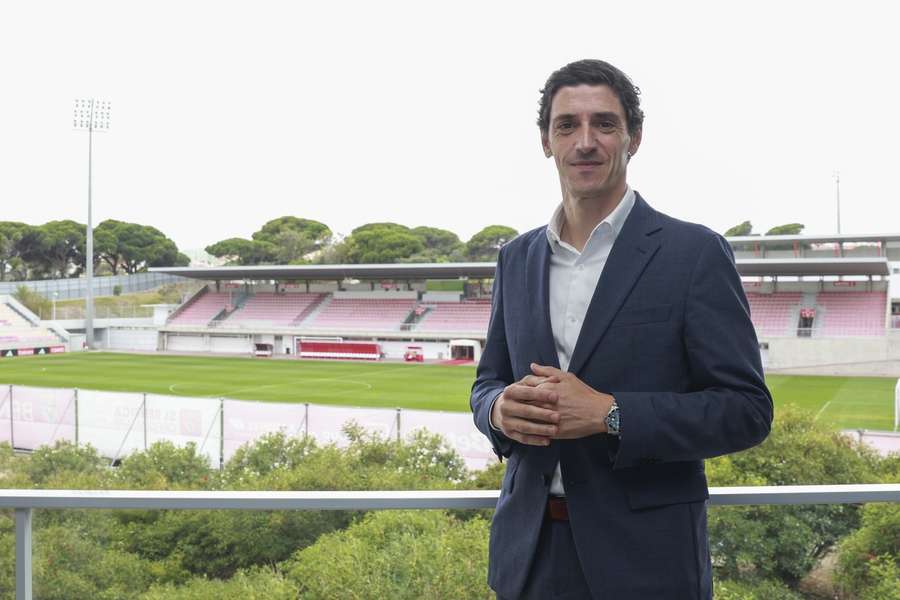Benfica Campus turned 19 in September. Naturally, since it was built, there have been major upgrades to improve the facilities for youth development. How much further can this infrastructure, which is the envy of many around the world, still grow?
"I think that, both through our relationship with the European Club Association and the fantastic opportunity we have with the Youth League and away matches, we get to know many academies and there’s always a great exchange, both when they visit us and when we visit clubs abroad.
"What I feel, both from my own visits and, above all, from the feedback we get from those who come here, is that this sports facility and Benfica’s youth development model are undoubtedly among the best in the world. I don’t think we’re behind anyone. This facility has evolved over time. From 2006 to the present, it has grown in different ways, but mainly in its own scale. It started with a few pitches, fewer teams, then increased the number of teams, and expanded the support services for players. So, right now, I have no doubt that we’re at the top level.
"What we’re noticing is that the pressure has increased. Benfica has continued to grow in terms of the number of teams, and in the not-too-distant future, we’ll have to consider the possibility of expanding this infrastructure, especially in terms of pitches.
"Let me give you an interesting comparison. We were at Chelsea for a Youth League match. In terms of working conditions, for people and for the facilities, for the players, I honestly think we’re better than Chelsea. In terms of methodology, we’re second to none. We have six grass pitches and, let’s say, two and a half artificial pitches. They have one artificial pitch and 31 grass pitches."
That’s quite a difference.
"For fewer teams. They have, in total, fewer than we do. All their youth teams use that space."
So, they don’t face the same challenges as Benfica when it comes to managing the pitches and planning.
"Not at all. Quite the opposite. Their first team has four pitches exclusively for their use. Their Under-21 team, which is equivalent to our B team, has two pitches for their exclusive use. This is a huge help, both for organising these more professional or transitional squads, but above all, we’re starting to feel it even in the younger age groups: the more access they have to natural grass, the better, because they start preparing earlier for where they’ll continue their careers.
"So, I think this is a world-class facility, no doubt about it, and I’m sure no one can say otherwise. There will come a time when we’ll have to think about expanding, especially the sports facilities."
Read more from Flashscore’s visit to Benfica Campus here!
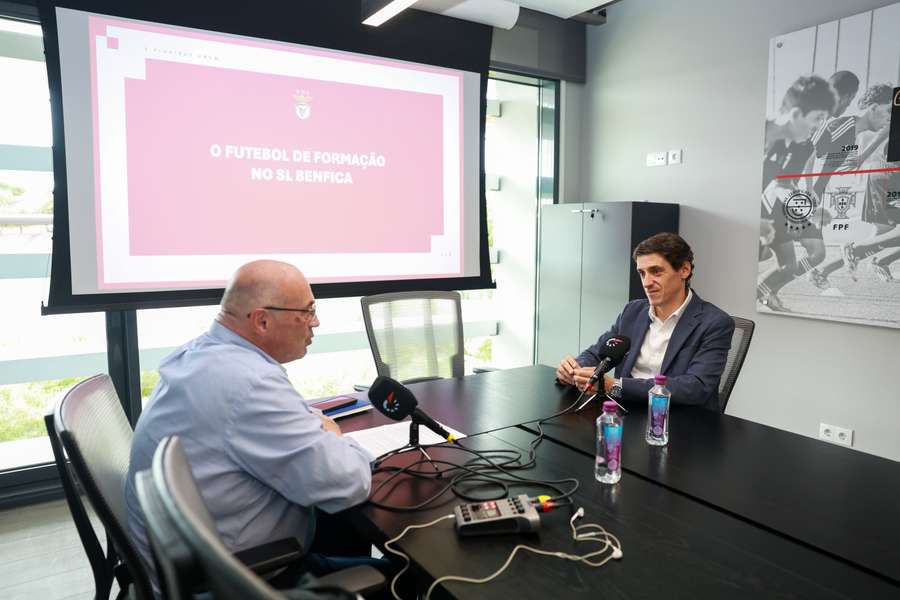
Could you also explain a bit about the internal organisation, especially the synergy between the different age groups, from the moment talent is identified? How does that process work? How important is the scouting network and its preparation? And what about all the branches that Benfica Campus has across the country?
"Benfica’s youth football is structured around four main areas. One is the youth football management, which handles scouting and contract management; another is the technical management, which deals with coaches and some sub-coordinations, including the initiation area, which is outside Benfica Campus. Within Benfica Campus, we have players from Under-14s up to the first team, but mainly from youth football up to the B team.
"The first team also uses our facilities, but is completely independent from youth football in terms of management. In Greater Lisbon, we have a major hub at the University City, with excellent and recently improved facilities, and Benfica also felt the need to expand to the rest of the country.
"Within Benfica Campus, no player can say they lack the conditions to perform their role or profession, whatever their age. I think the conditions are fantastic, with support services at every level. Besides the youth and technical management, we have an area we value highly: personal and social development management.
"And here, let me highlight an interesting number. All of Benfica’s youth development, including Benfica Campus, the big hub in Lisbon, and the other training centres across the country, involves about 600 children - kids, teenagers, and young adults - of whom 200 train at Benfica Campus, and 80 live here.
"This personal and social development management is extremely important, not only for supporting all youth development, but especially for those who live with us, because we have boys who, from the age of 12 or 13, leave their families to come live here, and we, at least in some areas, have to step in as their family, becoming their parents, grandparents, and siblings."
And sometimes that’s not always easy…
"I think it’s more than just not being easy - it’s very hard. But there’s an encouraging fact: no one has ever gone back. In 19 years, we had one case, which is fairly well known, of a player who didn’t adapt at first, and so Benfica, together with his parents, decided it was best for him to return home, stay connected to Benfica, and at the end of that season, he came back to stay."
And what are the criteria for kids to live here as boarders? Is it about geography, or even if they live close to family, is it about financial conditions? I imagine demand is huge and capacity is naturally limited.
"We have 80 places available. And, as you said, there have to be criteria when deciding who gets those 80 spots. That means sometimes, especially at a very young age, we have to make choices about which players can come and stay, and which can’t.
"Typically, what is our residence for? When these training centres were created, it was clear - and it probably hasn’t gotten any easier - that it’s hard to convince parents to let their children leave home so young, and also, for talent identified early, to keep them loyal to Benfica without a real connection.
"These training centers allow for a real link between the athlete and Benfica from an early age, so from six to 12, these boys are already playing in Benfica’s shirt, benefiting from Benfica’s methodology, being in contact with Benfica coaches, absorbing what we call the Benfica DNA, so that by 12, they’re much more in tune with this culture. From this group of about 200 players who finish their time at the training centres each year, it’s mainly from here that the 80 residents are chosen, and maybe a few more."
So those academies outside Lisbon act as a filter for the best talents?
"They’re the first filter. They take in the youngest kids, so they don’t have to travel 100, 200, 300, or 400 kilometres to train or play at Benfica Campus. They can keep living at home, with their parents, and have a normal life, while still playing football and benefiting early from our methodology. It also lets us keep a closer eye on these players and follow their development more closely."
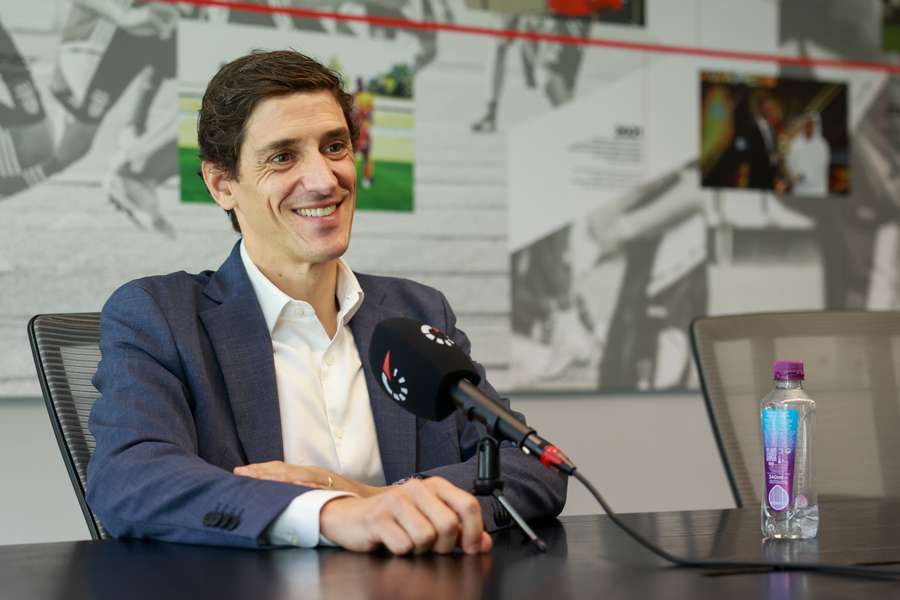
'80% will become professional players, 100% will become citizens'
And for a parent who trusts Benfica to look after their child, what can they expect in terms of education beyond football, which is so important for any young person’s growth? What does the club offer, not just to prepare players for the future, but also to prepare them as people with values and success in other areas, since not all will become professionals, even though the success rate is fantastic - eight out of 10 who come here become professional footballers.
"Yes, in fact, eight out of 10 who sign a professional contract - about 80 per cent, maybe a bit more - will continue their careers as professional footballers after leaving Benfica. I don’t know if there are many universities with that kind of employability rate.
"So, I think it’s a real reason for parents to believe their children could one day become footballers. Even if not necessarily in Benfica’s first team, that’s a very relevant point. I can’t forget that we’re a football club, but Benfica has a bigger role to play than just that. We can’t limit ourselves to just top-level training, competition, and playing conditions, which is our mission. We have to prepare them as footballers, as best we can, to make sure they can one day reach Benfica’s first team.
"That’s why there’s a significant investment in something that’s a bit outside their football development. Because while it’s true that about 80 per cent will become professional footballers, 100 per cent will become citizens and part of our society."
And it’s important to prepare them for that too…
"The personal and social development management area is essential for that. We allocate significant resources to supporting their education. Benfica has partnerships with schools. The truth is, many of these kids live in a bit of a bubble. They live in a residence with only boys who share the same interests. So, basically, they only talk about football, live football, play football, train football, breathe football, and watch football.
"We feel it’s our duty to get them out of that bubble a bit and show them there’s more to life. To have friends who aren’t just football friends, to have girlfriends, to have other kinds of relationships that aren’t possible in such a closed environment. We have partnerships with several schools, but especially with one public school and one private school, where most of our kids go, not just to fulfil their schooling requirements, but also to develop these relationships.
"We recognise the importance of this department. Let’s not forget we’re talking about 80 boys, aged between 12 and 18. There’s constant support. We have rotating tutors who are always present in these kids’ lives, as well as coaches and other support staff.
"There’s a complementary social action that starts being instilled in the youngsters from the beginning: working with shelters, underprivileged families, and social responsibility institutions. There’s a lot of closeness. So, Benfica has to play this role in the community."
It seems clear that every parent thinks they have a Messi, a Ronaldo, a Bernardo Silva at home. My question is: how do you manage the sometimes irrational expectations of a parent about their child, who may be influenced by them?
"We value the role of parents immensely. It’s very unlikely a youngster will become a footballer without the initial support of their guardian. It’s the guardian who, before he’s Bernardo Silva or Ruben Dias, takes him to training, picks him up, sits in the stands for two hours in the rain waiting for the game to end, and waits in the car for training to finish.
"Managing expectations, especially at a club like Benfica, is tough. Benfica has been able to bring youth players into its first team, which is most important, but even those who don’t make it to the first team often find another path that gives them financial security they might not find elsewhere. I understand that some parents can’t let go of this idea.
"Besides having a specific program called High Performance Parents to manage these expectations, there are a series of interactions over the years and seasons between parents, coaches, coordinators, and technical directors, always with this in mind. We also foster a close relationship with parents, knowing that once they entrust us with their boys, there has to be some separation.
"The truth is, times have changed, and we now have slightly different youngsters and slightly different parents. We have to adapt to that reality. What we’ve tried to do over time is to realise that dynamics are different from 10 or 20 years ago, and maybe even earlier."
But do you think this is decreasing, that is, are parents more aware that their child probably won’t be a Ruben Dias or a Bernardo Silva, and might just be an average player, or maybe not even make it as a footballer?
"No."
No?
"I don’t want to be unfair to many parents who are great examples, who let their kids have fun, play, learn, and develop in a completely normal and organic way. So I don’t want to be unfair to them, and there are many, but I recognise that, perhaps because of how society is evolving, there’s a significant number of parents who can’t manage this. That puts more responsibility on us, because we’ll always need youngsters to shape and turn into footballers."
The hardware and software of youth development
And that’s why you trust the technical teams, who work with them every day…
"Above all, that’s what Benfica is about. We usually divide the key factors for Benfica’s youth development success into two big blocks: hardware and software. Hardware is these facilities, where we are now, the hub that required a major investment at University City, having six training centres across the country - all of which require a huge investment.
"The other is software: people and culture. Competent human resources, aligned with our principles, values, and methodology. And giving these people the ability to interact with parents to explain what they can and can’t, should and shouldn’t do."
There’s a lot of talk about the 'Benfica DNA'. Can you explain what that is, and what are the most important components of it?
"I think it’s a combination of factors. First, Benfica has its long-term development program called 'Formar à Benfica'. Formar à Benfica is a platform we provide to our coaches, whether they’re at Benfica Campus, EUL, the training centres, or our academies abroad. It’s a project that aims to keep developing, and this platform is available to coaches in those places.
"It’s a very detailed platform on how Benfica sees youth development in every aspect: player profiles, what’s expected by position, what’s expected tactically from the team, and the game model.
"In all these areas, we invite our coaches to follow a model, naturally with some flexibility to add their own ideas, but based on a core model we believe will shape a certain type of player."
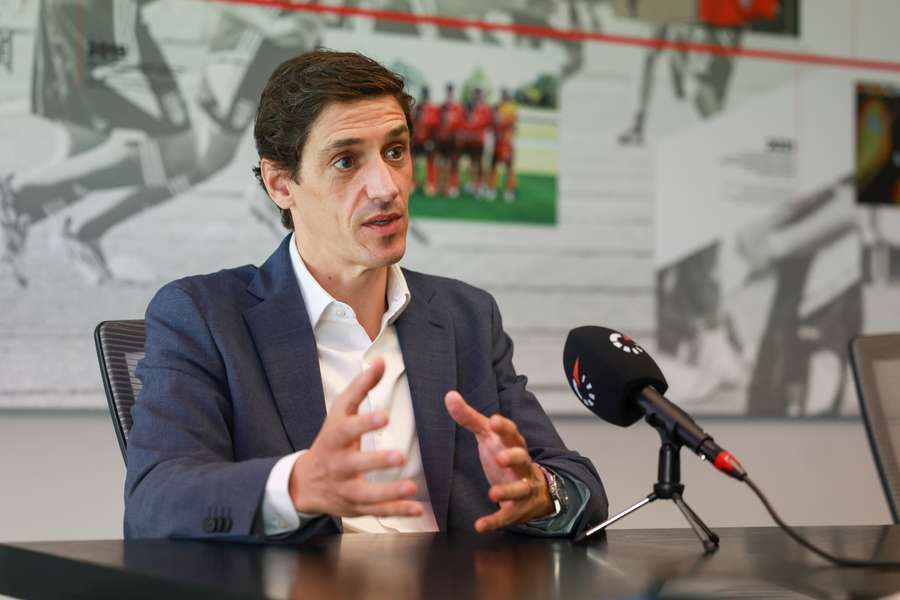
'The mission is to develop players for the first team'
So, the coach has the freedom to think and create based on the team’s dynamics, within the model Benfica promotes?
"Benfica’s youth football has a very clear mission: to develop players as well as possible so they can one day reach the first team. That’s our mission.
"If we can win competitions along the way, great, but we have to do everything we can to make sure our boys are as ready as possible to reach the first team. So that when the first team coach, staff, or general director needs a player for a certain position, they can look at the youth system and see players as close as possible to the first team standard. That’s our goal."
And that doesn’t change every time there’s a new head coach, right?
"No, not at all. That’s the point. Just as it can’t change when the first team coach changes. The club has a model, a profile it believes in. It believes in a player and in Benfica’s values. The player as an example of values on and off the pitch, but also in the four usual performance dimensions.
"Regardless of the coaches’ quality or experience, it can’t depend on the profile of a particular coach who might be at the club for a while and then leave. What we try to do is, regardless of who it is, at any level, have a model we recommend and suggest.
"You asked if it’s a rigid or flexible model. I’d say it’s somewhere in between. It’s not the most rigid, but it’s not the most flexible either. Because if it’s too flexible, it ends up…"
Losing its identity…
"What we want is for the first team coach, when looking at these youngsters, to recognise the characteristics that are typically expected and that the fans expect. It wouldn’t be the same if the game model the player spent five, 10, 15 years playing was different, if the instructions given were different, if the positioning on the pitch was different, if the way to behave on the pitch was different. So, what we want is real uniformity in how we prepare our players."
We know borders are open in Europe today. There are humanitarian crises everywhere. Portugal receives refugees. I know Benfica has a partnership with the Portuguese Council for Refugees. What does that involve, and could it be a recruitment niche if there’s quality?
"I’d split the answer into two perspectives: social and sporting. The partnership you mentioned is social. As I said about others, this complementarity created by the personal and social development management, we try to instil in our youngsters this sense of social responsibility, that there’s more to life than just football. There’s more to life than the privileged residence at Benfica Campus. There are other, much tougher realities."
And the Benfica community usually support these causes?
"Especially through the Foundation. But we, having our own youngsters here, can also play that role. So, there’s a social path. You asked if, from a sporting perspective, this could be interesting for us. I’d say there isn’t a specific project for that purpose."
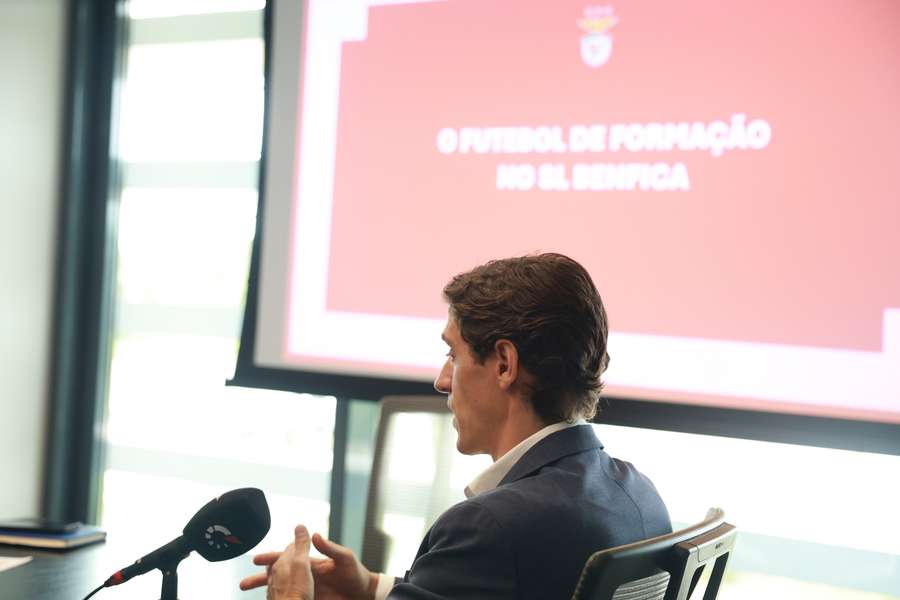
'The gold mine is in Portugal'
But it could happen in isolated cases…
"It has happened, even without a specific project for those cases. We still believe the gold mine is in Portugal. We really like Portuguese talent, and it’s in young Portuguese players that we want to keep investing. We do look at the international market, but our main focus is the national market, because that’s where we believe the talent is.
"Internationally, especially in countries with humanitarian crises and specifically in Ukraine, Benfica had a football school there. When the war started, we had to close it. What we did then was allow young people who might come to Portugal, due to the wave of Ukrainian immigration, to enrol in our schools at no cost. And there were some cases where families came to Portugal and their children joined our football schools.
"Also, FIFA at the time created an exception to the rule that doesn’t allow young players to move at a very young age - European youngsters up to 16, and outside Europe only from 18. There was a Ukrainian youngster who benefited from this exception and is now in our competitive teams, and despite the huge hardship his family went through, he found a kind of refuge here to keep developing his career."
In recent years, there’s been another reality: identifying talent that can finish its development in Portugal. Is Benfica also alert to this?
"Without downplaying the importance, and it’s easy to see - just look at our youth teams and see how important Portuguese players are. With rare exceptions, almost all our players are Portuguese. What we notice is that young foreign players who try to join our academy, with rare exceptions, struggle. Maybe because our athletes, over so many years, have been exposed to such a clear and defined DNA injection."
They can’t absorb it anymore…
"It’s harder for a player with very different characteristics to fit in easily. There’s a market we pay special attention to, and where we’ve had some success: the market of Portuguese descendants. So, Portuguese citizens who emigrated, especially in Europe, whose children like football and have talent, we try to look at them more closely.
"We find it’s easier for these youngsters to adapt than for a foreign youngster who comes to Portugal at the right age. We might be talking about kids who’ve already spent 10 or 12 years at Benfica. It’s hard to integrate. There are exceptions, and it does happen, but I admit it’s not easy for a youngster."
The Youth League in 2021/22 and the U20 Intercontinental Cup in 2022 are at the top of the youth team’s achievements, along with 78 more titles across various national and district competitions. Are you satisfied with these numbers, or is there potential to go much further?
"That’s a tough question, because I can never forget - professionally - what our real mission is. I admit some Benfica members might not agree with what I’m about to say, but our mission is to develop players for Benfica’s first team.
"If we can do that and win titles, great. It’s also part of the Benfica player DNA to cultivate a winning mentality. Of course. But we all have to be prepared, at some point, to put that second. Sporting results in favour of player development. And that can have a direct impact."
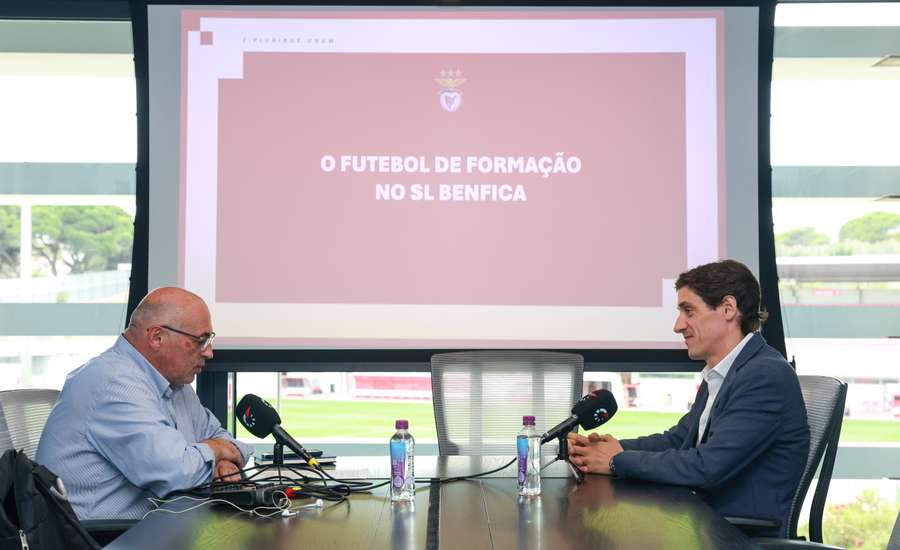
'We have to bring at least two players a year into the first team'
Would you trade a youth title for three players in Benfica’s first team?
"Of course. I have to say yes to that. That’s our mission. That’s what I work for every day, that’s what I was asked to do. Of course, I’m also delighted and celebrated every title we won last year. Besides the national championships, we also won the U23 Revelation Cup for the first time, which is a tough age group at Benfica, very demanding for both coach and player.
"We have to keep reminding ourselves of our mission, to make sure no one forgets that what we really have to do here is bring at least two players a year into the first team. That’s our mission."
We’ve already talked about Benfica’s high standards. Is the transition to senior football the hardest phase? How do you work on that here? And again, how do you manage expectations, since not everyone will make it?
"It’s tough. At Benfica, the B team is part of the youth football structure, not the professional football structure. Still, we try to explain to the players that we have to shift a bit from a development mindset to a performance mindset.
"That is, a player who reaches Benfica B is supposed to be knocking on the first team’s door. So, they have to be ready for the first team’s demands. We have to make sure our players, especially in the U23s and B team, are comfortable with this pressure. Because, if all goes well, one day, sooner rather than later, they’ll be in a stadium with 70,000 people shouting, or in an away stadium with just as many."
And sometimes there are surprises, because when Joao Neves was promoted to the first team, not many people in Portugal - not just Benfica fans - knew about his quality. And now he’s a European champion…
"That’s the point. The message we try to give our players is: every player who reaches the B team, we truly believe can have that opportunity. Some may be a bit more ready, others less so, but the message is: now it’s up to you. Every player in the B team or U23s has to push to knock on the first team’s door.
"I like to use this analogy: players have to go through three stages. They have to get their foot in the door - and a lot of that is up to them, because we provide all the conditions, but then they have to want to get their foot in the door, they have to want to come in and stay, and they have to earn their place at the table. They have to show the first team coach, and everyone, that they’re ready.
"Our job is also to recognise potential, regardless of current performance. But those who reach the B team, we see the potential for that to happen. Performance will depend on their ability to take that step forward, which sometimes depends on their physical attributes, tactical and technical ability, understanding of the game, but a lot depends on their desire.
"They have to be hungry, as our first team coach (Jose Mourinho) said, they have to want it. We have a strong psychology department that supports them and ensures they’re doing well and managing expectations. But part of it is innate."
It’s a personal DNA, apart from the Benfica DNA, and together they can create an outstanding player…
"That’s when it comes together. Not everyone will make it, but those who do, I think, we can count on. Honestly, I think very few players who reach Benfica B after coming through the ranks can say: 'Benfica didn’t give me everything. Benfica didn’t give me all the tools to become a professional footballer and reach the first team.' Part of it is up to them. When the two come together, top players are born."
Deep down, do you think it will be possible, now or in the future, to keep talent so that the first team is made up of 50 or 60 per cent academy players? Or do you think that’s only possible in the distant future? Because it’s getting harder to keep talent in Portugal.
"There are challenges at every stage. The transition to professional football is the big challenge. I feel Benfica has made significant progress in retaining talent. The path and career plan presented to players is very interesting. I feel that before 18, with their guardians, and after 18, with the players themselves, they feel Benfica clearly values their journey.
"Football today doesn’t have many secrets, does it? It’s hard to find a player no one has noticed. That doesn’t really happen anymore. There might be one or two who were less known, but it’s hard for someone to appear out of nowhere and suddenly become a star.
"Our job is to prepare as many players as possible. We set ourselves a target of two players a year. If it can be four, six, eight, 10, or even more. The more we invest in youth development, the more opportunities we give our kids, the more guarantees we’ll have.
"The truth is, there’s a lot of talent in Benfica’s youth system. I have no doubt that of those 80 per cent we talked about at the start, who will become professional players, many have what it takes to play at the top level."
'A player who comes through Benfica’s academy carries a seal of quality'
Just look at the titles won, the clubs they play for, and the national teams…
"Exactly. There are two very interesting facts I’d like to share. Benfica was the European club with the most players at the last U17 European Championship. They were champions. Even if they hadn’t been, it would still be an honour for Benfica to have been the club with the most players in a national team. So, in the U17 European champions, the most represented club in Europe is Benfica. That says a lot about the talent in the academy.
"But even those who leave, there’s a very interesting study by the International Centre for Sports Studies, which created an indicator called the 'Training Index' to define a player’s importance in a team. They analysed 50 leagues worldwide. The club with the most impactful players is Benfica. This is very important, because it shows that not only the European champions who are still here, but also the 80 per cent who leave Benfica’s academy, carry a seal of quality."
In the last 10 years, Benfica has made over 600 million euros from player sales. That’s more than its main rivals combined. What does that mean?
"Now, after that study, I think we’re around 800 million…"
Which is a fantastic number…
"It’s very good, for several reasons. It shows that the return on investment in Benfica’s youth development is huge. There are few companies that, with the investment made in Benfica Campus over the last 19 years, achieve such profitability.
"We want our players to sit at the table with the others, with the seniors, and really take part. Here’s a very significant fact, which I fear sometimes isn’t clear to people, and I think we need to stress: on average, more than 20 per cent of the minutes played by Benfica’s first team each season are by academy players. So, the impact of Benfica’s youth system on the first team represents, annually - except for the Covid years - over 20 per cent of the total minutes played by the first team in a season. It’s hard to compare.
"It’s not very clear, but a study tried to identify - this naturally varies a lot from club to club - a kind of European average, which is about 15 per cent of academy players in first teams. So, there were seasons when Benfica almost doubled the average use of academy players, which goes against the idea that Benfica, despite being a very capable academy, only benefits others, even if it is financially profitable."
That brings us back to the challenge of retaining talent, which is to keep talent a bit longer. Not forever, but a bit longer, right?
"Yes…"
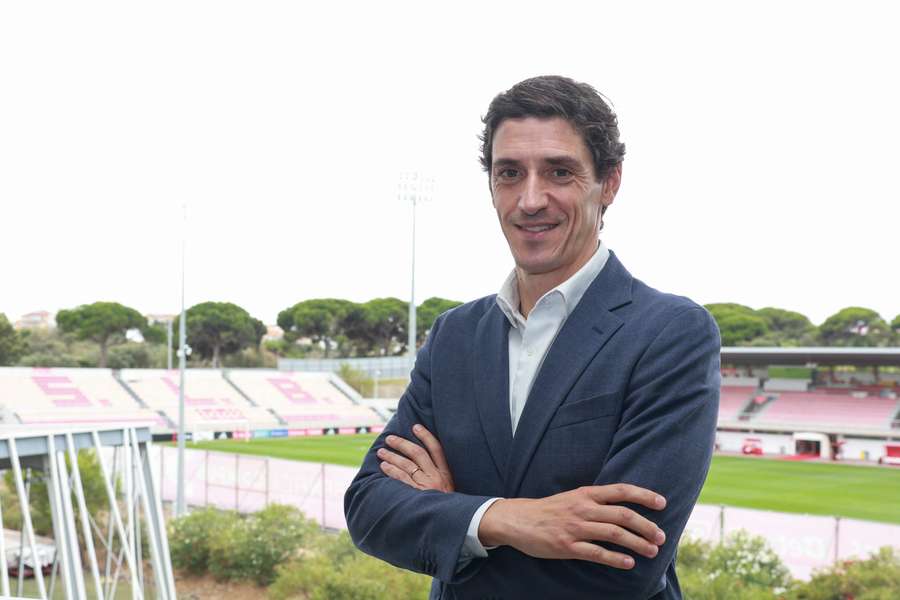
Just look at players like Bernardo Silva, Goncalo Ramos, more recently Florentino, Ruben Dias, Joao Neves - so many players at top clubs in the so-called 'big five' leagues. That alone is clear proof of the quality produced here, with a seal recognised in Europe and worldwide.
"Yes, I still agree, when you say that’s the big challenge. To be fair, it’s not just at Benfica; it happens at all Portuguese clubs. But to be fair to the management of Portuguese clubs and to Benfica, which is what matters to me, I think we have to look at this phenomenon seriously. The way Portuguese football is set up, it’s hard for a club to survive without player sales. You could say the model is wrong and needs improvement. I agree with both. I hope and believe progress is being made.
"But the reality today is this: there's extraordinary income from player sales. That’s the club’s perspective, but we can’t forget the player’s perspective. I recognise that for a young player, there are salary limits at a club like Benfica that are hard to exceed, especially compared to other players. Because it’s not just about raising the bar for one. What about the others? We’re talking about a team with several important players. The player who earns X and could earn X plus 20, 30, 50, or 100 per cent, and who is offered a salary eight, 10, 12, 15, 20 times what he could expect here."
But it’s very hard to compete with that…
"If we’re honest, it’s also hard for the player. Anyone, no matter how much they love their job, works to earn money to support their life. There are others, but few, who don’t need their job to live. But that’s the reality for a significant percentage of people. So, naturally, if the goal is to earn money from work, and you’re offered much more to do the same job, you’ll probably accept. Then there’s the sporting perspective.
"The truth is, right now, Benfica doesn’t have the same ambitions as other, much richer clubs. While it’s obvious that Real Madrid is a top contender to win the Champions League or Club World Cup, or anything else, that’s not the case for Benfica. Benfica has that ambition, and rightly so, given its history, but it’s not obvious that it’s the top favourite.
"For a young player who’s offered the chance not only to earn in one year what he’d make in 10 or 20, but also to have clear ambitions, to play for the biggest titles in the world, I think our challenge, as a youth academy, is to create more quality players so that one will finish his journey in year one, another we can keep for year two, another for year three.
"That’s our challenge: to prepare them even better so they get more opportunities to show they can follow this plan to the end."
When we talk about development and progress, most people only think about the player, forgetting that there are many people involved in a player’s development who also need to be trained. How does Benfica work on that?
"That’s absolutely essential, especially considering there are hundreds of staff in various areas whose goal is to give our youngsters everything they need to succeed.
"Earlier I mentioned the four main areas we have here, but I’d say, indirectly, not directly in youth football, Benfica has a huge area it pays a lot of attention to, which is also centralized for youth football and other sports: HPD, the Health and Performance Department, which covers medical, physiotherapy, strength and conditioning, nutrition, and psychology, all supporting the athletes, as well as the usual support from coaches, assistant coaches, individual coaches, and the more technical, direct support staff.
"The question is especially interesting because of something that’s been happening lately. It’s not just our players’ quality that’s been recognised outside Benfica. So, the same challenges we have in retaining players, we also have with staff. Benfica has a clear and defined training plan for its staff, and so they’re also targeted by competitors with more financial power than Benfica, and that’s also been a reality in Benfica’s youth football recently."
'Fans can play an active role in player development'
With everything produced here and all the success, what is the role of Benfica’s fans?
"On a small change we tried this year, we talked about exactly that. Let me give an example. Our B team is, historically, a young team. This year, the average age of our B team is just over 19, and they play in Liga 2. On average, the age gap between our B team and our opponents in the first rounds of Liga 2 has been eight to 10 years. This will always be tough, but it’s less tough if they have support.
"We can give them all the tools for success, but there’s one thing we can’t give them. I can’t have one of these boys walk into Estadio da Luz and be left speechless: 'Wow, what is this? I’ve never experienced anything like this, I don’t even know what this is.' What I’d like is that, at least in home games and maybe away games, they start to feel that.
"For that, we depend on our fans, because at the end of the day, it’s that ability to feel the pressure Benfica brings, to understand the expectations, to feel the demands from Benfica fans. That will be one of the most important factors in determining these players’ success or failure.
"As a Benfica fan, I like the idea of trying to foster that, of getting to know the stars of the future earlier. Come and watch and support the teams at all levels. The fans can play an active role in player development."

